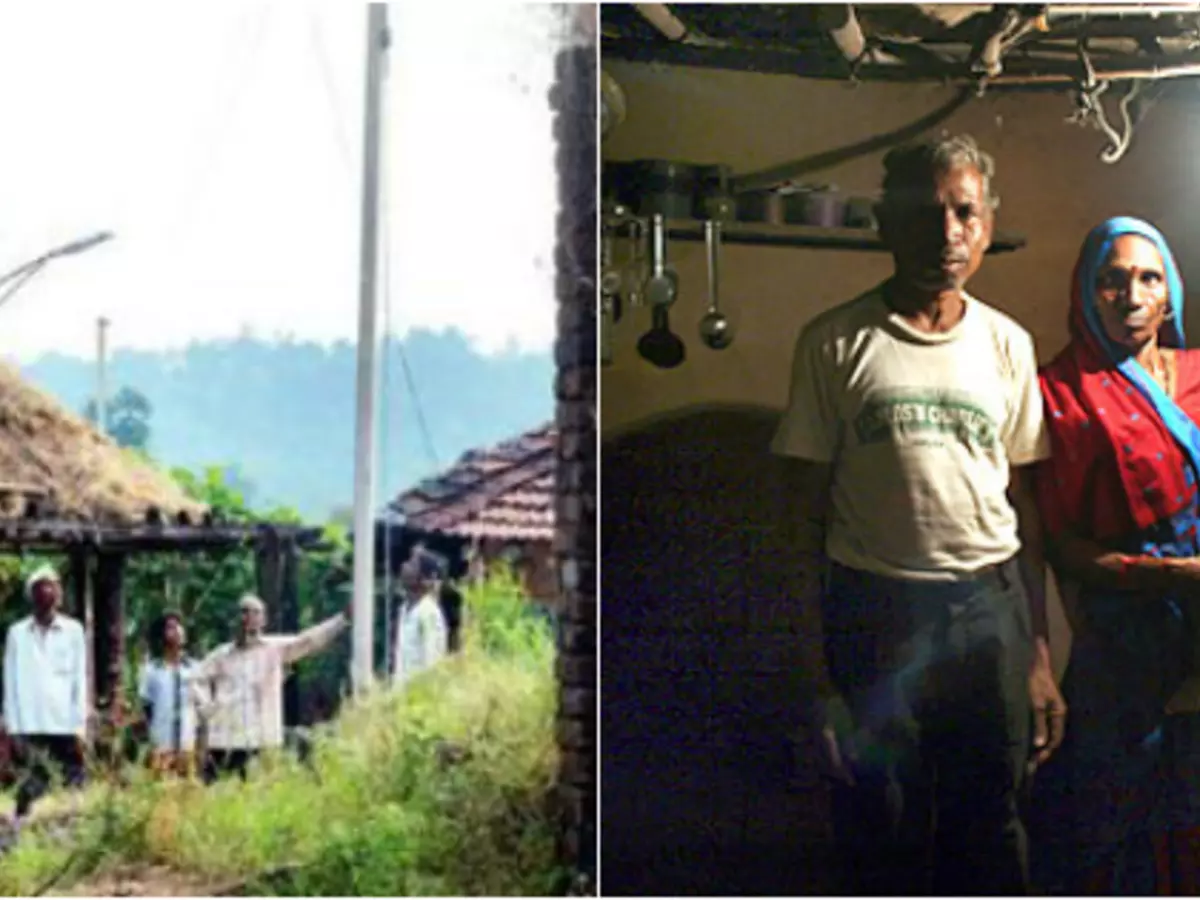68 Years After Independence, This Village Will Finally Be Lit Up For Diwali With Electric Lamps

Unintentionally, Ramdas Khanjode is cracking up the shy audience of women and kids seated under a canopy of bottle gourds. The lanky 40-year-old is talking about the many times he has mounted the roof of the tall, white-washed house nearby and waved his Tata mobile phone violently in the air, pleading skywards for the elusive single bar of reception.

Images: TOI, Rediff (Image on right for representational purposes only)
"Mostly, this is when I have to convey bad news to relatives," says Ramdas, to more cackles.
'Out of coverage area' is a phrase that both defines and defeats Wada taluka's Tilmall village where, till last week, the sun would charge Ramdas' cellphone. It was only on October 12 this year that electricity hobbled its way into this sleepy hamlet which is only a bit over 100 km from Mumbai but so far relied on kerosene lamps and solar lanterns for light.
"I doubt politicians even know this village exists," smirks 19-year-old Baban, the driver of our jeep, which squeaks, rumbles and spits out hay in protest on the undulating 4-km path from Wada's Ogada village to Tilmall. Politicians, mind you, do manifest in this neighbourhood. "They have had electric poles dug into the ground during elections and then fled with them soon after," says Vijay Jadhav, joint secretary of Shramajeevi Sanghatana, the organisation that helped bring power to Tilmall.
The village was first lit up on an Amavasya day
Vivek Pandit, chief of Shramajeevi Sanghatana, deliberately chose a dark Amavasya Monday to inaugurate light bulbs in the village. "It looked like Diwali that day," recalls Wada's police inspector Sanjay Hazare, about the village that served up an elaborate feast on banana leaves, as its pink anganwadi filled up with transparent electric meters.
Now, it is taking the moustachioed Eknath Khanjode unusually long to light the noose-like wick of the kerosene bottle, in whose glow women here cook, kids study and midwives delivered babies till a while ago. "I haven't used it in a week," explains the beneficiary, whose home now boasts a lightbulb under a photo of Asaram Bapu. There is a hole in the middle of 47-year-old's Eknath's mud flooring, in which the patriarch grinds spices. He has heard of the mixer. "But we need a fan first," he says.
So far, the ceiling fan has only arrived in 35-year-old Baban Khanjode's mud hut. Here, it hangs so low that it almost kisses the bed of golden paddy below. A sand mine worker, Baban visits the wetlands in Khar and Bhiwandi twice a month for work where he shares a room with 15 others and a TV.
When TV finally arrived
This is where he learnt to speak Hindi. "The first thing I saw on TV was Shaktiman," smiles the 35-year-old, who now likes watching matches after work.
"I am planning to bring home a TV this Diwali," smiles Baban, whose wife Lalitha loves watching Suneil Shetty and Akshay Kumar's films on her brother's TV set in Wada.
For a place that is closer to Mumbai than even Pune is, it should not have taken this long for 22 electricity poles to reach.
But then, the speed of light is often impeded by red tape as isevident from the fact that 187 hamlets in Palghar are still living in the dark. In Khodada, a village near Tilmall, for instance, power came merely two years ago. "Now, there are four television sets there, two of which are for CDs," says Bhupesh, a BCom student from Khodada, who does not like watching TV and prefers getting a newspaper from Wada instead. It was when he worked in a cellphone store in Wada, that he learnt the marked difference between their ways of life. "We are still very primitive," he says. There are no toilets, water pumps or means of transport in Tilmall. To demonstrate how they transport patients, villagers spread out a bedsheet, tie both ends to a bamboo and ask a girl to jump in the makeshift cradle. She holds on to the stick like a pig on a skewer and enjoys the ride. To fetch water, women travel one and a half kilometres to the Gargai river, carrying four pots each twice a day. They all complain of headaches. "I am losing hair because of it," laments one.
They all know there is a better life and can see through the lies of politicans but discomfort has become a habit.
Discomfort is a habit here
"When it's hot, we just fan ourselves a kerchief," says Ganpat Khanjode, whose village does not even have hand-held fans. Ganpat, whose house now has three bulbs, one directly above the place where his wife, Manda, washes utensils, says he won't buy a fan any time soon.
"My daughter is doing a nursing course and the fee is Rs 9000," he says. Curiously, the lack of electricity has not interfered with matrimonial prospects so far.
"The bride's family only enquires about land and buffaloes," says Ganpat Khanjode. Still, the fact remains that most women here have come from dark villages. The few exceptions had to make sacrifices. When asked about these, Pratima Dode who hails from the electrified Shiraj village, does not utter a word of complaint. Her mother-in-law is sitting nearby. On the other hand, Kalpana Dode, who had refrigerators and a TV back home in Jawhar, seems to have got her revenge long ago. "My daughter is married to a man in Mokhada," she says. "It has power."
(Originally published in The Times Of India)








